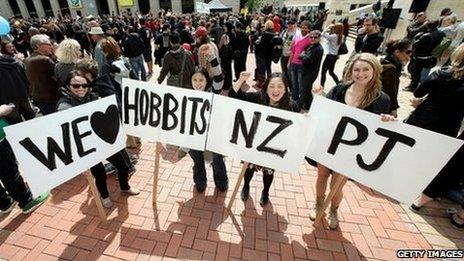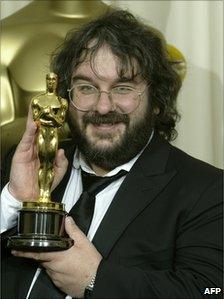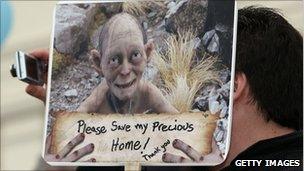New Zealand's 'love affair' with The Hobbit
- Published

Thousands rallied in New Zealand to keep The Hobbit in their country
At the Premier of The Two Towers in 2005, a red carpet ran for miles through the streets of Wellington, New Zealand.
Watched by a 60ft Gollum, tens of thousands lined the streets as the stars walked by.
In a strange inversion of post-colonialism Tolkien's fantasy England, "The Shire" had been permanently moved 12,000 miles around the world.
So it is hard to imagine that the prequel to the Lord of the Rings, The Hobbit, could be made anywhere else.
But this week the location of the shoot of The Hobbit is up for grabs. There might even be a chance that it could be filmed in the place on which Tolkien's Middle Earth was originally based, the UK.
'Potential show-stopper'
Getting a film with a price tag in the hundreds of millions to get the green light has been tough in the recession.
Despite initially not wanting to, Peter Jackson has had to put himself into the directing chair to make the project financially viable, and just last week Warner Bros gave the go-ahead.
Everyone was relieved, from the producers to the Ring Tour operators, who bus fans up and down the countryside on location trips.

Jackson received a knighthood in New Zealand earlier this year
Everyone was looking forward to another hit of investment, tourism, glamour and, most importantly for a small isolated country, national pride.
And then the unions threw a spanner in the works.
It is not clear how it started, but NZ Actors Equity, an "autonomous part" of the Australian Media and Entertainment Artists Alliance (MEAA) woke up one day to find that the MEAA had put out a worldwide recommendation that actors not sign up to The Hobbit.
The ban received worldwide support and it seemed like a potential show-stopper.
It was certainly contentious.
On the one hand were actors pointing out the inconsistencies of terms and conditions for NZ actors when compared with their overseas colleagues.
On the other were the producers, technicians and other actors upset about this threat to their livelihood.
There were also conspiracy theories that Warner Bros were using the threat of their imminent withdrawal to push for better tax breaks.
'Kiwi mould'
It quickly became clear that this was about more than a film - this was a question of national identity.
The Kiwi identity is bought up on legends of small-town Leonardo de Vincis, of convention-defying iconoclasts who made something from nothing.
It is a mould Jackson fits. He made his first movie, Bad Taste, at weekends, and is listed in the credits as producer, cinematographer, special effects, make-up artist, editor, writer and has an acting credit for two roles - including a scene where he fights himself.
But, although it is not like the world is full of boys who tried to remake King Kong in stop-motion at the age of nine, it is not unusual for film directors to be that obsessive.
What is unique about Jackson is that he stayed in New Zealand.

Warner Brothers is due to hold meetings to decide the location of the prequel
Instead of running to Hollywood to make movies, he performed some magic of his own and got the money to run to him. He built a Hollywood-style film studio in Wellington, a small windy town on the edge of the world.
In rolled the stars, in rolled the millions, in rolled the Oscars. Then the tourists followed. And finally, the Knighthood.
If individual resourcefulness and "have-a-go" culture is a religion in New Zealand, then Jackson is something of a god.
So the unions were always going to find it heavy going to take him on, and last week, after winning some minor concessions, they backed down and pledged that there will be no unrest during the shoot.
Problem solved? Not yet. The problem now is that Warner Bros are very nervous about industrial unrest.
So, despite the assurances from Equity and the government, which has pledged to change the law if needed, it still could all go to another country.
In an extraordinary show of support, thousands of ordinary people took to the streets up and down the country to demonstrate in favour of The Hobbit being made in New Zealand.
Jackson, the New Zealand Prime Minister John Key and Warner Bros are getting together on Wednesday for a last-chance talk.
The Kiwis will be hoping their show of unity will convince the studio that all the players are a true fellowship.
Everyone is now praying that infighting has not cost them Middle Earth.
Allen O'Leary is a New Zealand expat playwright living in London. His recent play, My Inner Orc, was about a Lord of the Rings Convention in Croydon.
- Published25 October 2010
- Published26 October 2010
- Published27 September 2010
- Published26 September 2010
- Published17 October 2010